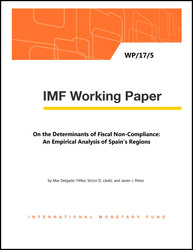
On the Determinants of Fiscal Non-Compliance
An Empirical Analysis of Spain’s Regions
This paper proposes an empirical framework that distinguishes voluntary from involuntary compliance
with fiscal deficit targets on the basis of economic, institutional, and political factors. The framework is
applied to Spain’s Autonomous Communities (regions) over the period 2002-2015. Fiscal noncompliance
among Spain’s regions has shown to be persistent. It increases with the size of growth
forecast errors and the extent to which fiscal targets are tightened, factors not fully under the control
of regional governments. Non-compliance also tends to increase during election years, when vertical
fiscal imbalances accentuate, and market financing costs subside. Strong fiscal rules have not shown
any significant impact in containing fiscal non-compliance. Reducing fiscal non-compliance in multilevel
governance systems such as the one in Spain requires a comprehensive assessment of
intergovernmental fiscal arrangements that looks beyond rules-based frameworks by ensuring
enforcement procedures are politically credible.
Publication date: January 2017
ISBN: 9781475569841
$18.00
Add to Cart by clicking price of the language and format you'd like to purchase
Available Languages and Formats
| English |
Prices in red indicate formats that are not yet available but are forthcoming.
Topics covered in this book
This title contains information about the following subjects.
Click on a subject if you would like to see other titles with the same subjects.
Fiscal compliance , rules , fiscal federalism , soft budget constraints
Summary
Copyright © 2010 - 2024
Powered by:
AIDC



